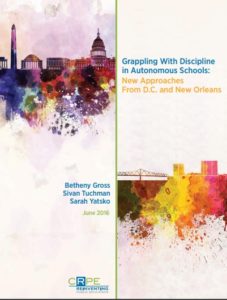 When charter schools make up a big part of the school system, or almost all of it, who makes sure students don’t fall through the cracks? Who makes sure schools don’t unfairly expel large numbers of struggling students?
When charter schools make up a big part of the school system, or almost all of it, who makes sure students don’t fall through the cracks? Who makes sure schools don’t unfairly expel large numbers of struggling students?
A new report from the Center of Reinventing Public Education looks at how school systems in charter-heavy Washington, D.C. and almost-all-charter New Orleans have begun to answer those questions.
In recent years, the two districts have managed to reduce suspensions and expulsions, which tend to disproportionately affect children of color and students with special needs.
In Washington, the report finds suspensions and expulsions have fallen since the 2012-13 school year, when the school district started publishing detailed discipline data for individual public schools, both charter and district-run.
Much like parents gravitate to schools with higher test scores, those that have a choice may be more likely to send their children to schools that remove fewer children from the classroom for disciplinary reasons.
The report notes:
A high number of suspensions may signal to parents that the school strictly enforces a disruption-free learning environment, which they could see as positive. But it may also signal that the school is highly disruptive or that students are treated harshly, which they could see as negative. It is not clear how parents will use these data, especially when other information sources like peer networks and school visits could provide them with more nuanced information. In time we will learn whether the improvements in public access result in more ready use of the data by parents, as well as how they use it.
The effort remains a work in progress, the report says, and school leaders will need to train teachers to give them the “skills and confidence to carry out more constructive and less punitive discipline strategies while still maintaining orderly learning environments.”
Meanwhile, New Orleans, where charter schools comprise almost the entire school system, had been plagued by reports of schools “pushing out” disruptive students.
In response, the Recovery School District created a set of common rules schools must follow when they expel students, as well as a centralized hearing process. Students who are kicked out of school get academic support while they look for other options, and get help re-enrolling in new schools that are equipped to meet their needs.
As a result, the report says, expulsion rates dropped “dramatically,” and schools have begun to develop “student-centered alternatives to expulsion.”
[S]o far, the challenges of managing a centralized expulsion program in a highly decentralized system have been minimal. Schools, for the most part, do not believe the system infringes on their ability to maintain safety and order. In all, the [New Orleans approach] offers a promising model to other cities, including those, like New Orleans, with many schools of choice overseen by more than one government agency as well as cities with highly traditional school districts interested in making expulsion decisions more consistent across schools. New Orleans demonstrates how small compromises on school autonomy can produce large benefits for students and schools systemwide.
The main shortcoming of New Orleans’ approach is that it doesn’t cover suspensions.
Still, like the transparency approach taken in D.C., it could offer a model for school systems that want to create fairer approaches to school discipline, adapted to the new definition of public education, that keep struggling students from falling through the cracks.


